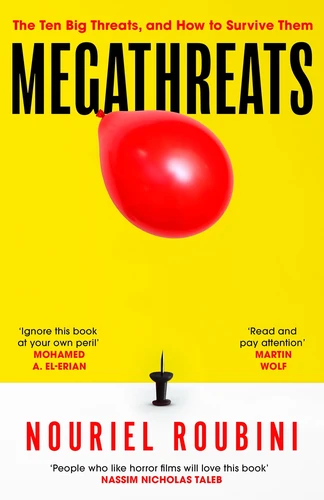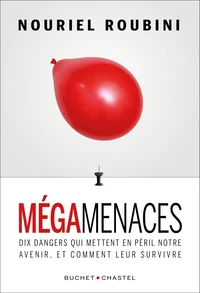Megathreats. Our Ten Biggest Threats, and How to Survive Them
Par :Formats :
E-Book
E-Book disponible
Disponible dans votre compte client Decitre ou Furet du Nord dès validation de votre commande. Le format ePub protégé est :
- Compatible avec une lecture sur My Vivlio (smartphone, tablette, ordinateur)
- Compatible avec une lecture sur liseuses Vivlio
- Pour les liseuses autres que Vivlio, vous devez utiliser le logiciel Adobe Digital Edition. Non compatible avec la lecture sur les liseuses Kindle, Remarkable et Sony
- Non compatible avec un achat hors France métropolitaine
 , qui est-ce ?
, qui est-ce ?Notre partenaire de plateforme de lecture numérique où vous retrouverez l'ensemble de vos ebooks gratuitement
Pour en savoir plus sur nos ebooks, consultez notre aide en ligne ici
- FormatePub
- ISBN978-1-5293-7379-0
- EAN9781529373790
- Date de parution01/03/2023
- Protection num.Adobe DRM
- Infos supplémentairesepub
- ÉditeurJohn Murray
Résumé
A Financial Times Economics Book of the YearA Times Business Book of the YearA Sunday Independent (Ireland) Book of the Year'People who like horror films will love this book' Financial Times'Forewarned is forearmed. Read and pay attention' Martin Wolf'Not only will the reader be better off after reading this book, but the world will be a better place' Nassim Nicholas TalebWe are heading towards the worst economic catastrophe of our lifetimes - unless we can defend against ten terrifying threats.
World renowned economist Nouriel Roubini was nicknamed Dr. Doom until his warnings of the 2008 housing crisis and Great Financial Crisis came true - when it was too late. Now he's back with much scarier predictions, ones that we ignore at our peril. There are no fewer than ten overlapping, interconnected threats that are so serious Roubini describes them as megathreats - with each one potentially amplifying the others.
From the worst debt crisis the world has ever seen, to governments pumping out too much money and causing inflation, to borders that are blocked to workers and many shipments of goods, to the rise of a new superpower competition between China and the US, to pandemics and climate change that strike directly at our most populated cities, to the threat to jobs coming from AI, we are facing not one, not two, but ten causes of disaster.
Today, we are heading towards a Great Stagflation that will make the 1970s look moderate. There is a slight chance we can avoid it, if we come to our senses - but we must act now.
World renowned economist Nouriel Roubini was nicknamed Dr. Doom until his warnings of the 2008 housing crisis and Great Financial Crisis came true - when it was too late. Now he's back with much scarier predictions, ones that we ignore at our peril. There are no fewer than ten overlapping, interconnected threats that are so serious Roubini describes them as megathreats - with each one potentially amplifying the others.
From the worst debt crisis the world has ever seen, to governments pumping out too much money and causing inflation, to borders that are blocked to workers and many shipments of goods, to the rise of a new superpower competition between China and the US, to pandemics and climate change that strike directly at our most populated cities, to the threat to jobs coming from AI, we are facing not one, not two, but ten causes of disaster.
Today, we are heading towards a Great Stagflation that will make the 1970s look moderate. There is a slight chance we can avoid it, if we come to our senses - but we must act now.
A Financial Times Economics Book of the YearA Times Business Book of the YearA Sunday Independent (Ireland) Book of the Year'People who like horror films will love this book' Financial Times'Forewarned is forearmed. Read and pay attention' Martin Wolf'Not only will the reader be better off after reading this book, but the world will be a better place' Nassim Nicholas TalebWe are heading towards the worst economic catastrophe of our lifetimes - unless we can defend against ten terrifying threats.
World renowned economist Nouriel Roubini was nicknamed Dr. Doom until his warnings of the 2008 housing crisis and Great Financial Crisis came true - when it was too late. Now he's back with much scarier predictions, ones that we ignore at our peril. There are no fewer than ten overlapping, interconnected threats that are so serious Roubini describes them as megathreats - with each one potentially amplifying the others.
From the worst debt crisis the world has ever seen, to governments pumping out too much money and causing inflation, to borders that are blocked to workers and many shipments of goods, to the rise of a new superpower competition between China and the US, to pandemics and climate change that strike directly at our most populated cities, to the threat to jobs coming from AI, we are facing not one, not two, but ten causes of disaster.
Today, we are heading towards a Great Stagflation that will make the 1970s look moderate. There is a slight chance we can avoid it, if we come to our senses - but we must act now.
World renowned economist Nouriel Roubini was nicknamed Dr. Doom until his warnings of the 2008 housing crisis and Great Financial Crisis came true - when it was too late. Now he's back with much scarier predictions, ones that we ignore at our peril. There are no fewer than ten overlapping, interconnected threats that are so serious Roubini describes them as megathreats - with each one potentially amplifying the others.
From the worst debt crisis the world has ever seen, to governments pumping out too much money and causing inflation, to borders that are blocked to workers and many shipments of goods, to the rise of a new superpower competition between China and the US, to pandemics and climate change that strike directly at our most populated cities, to the threat to jobs coming from AI, we are facing not one, not two, but ten causes of disaster.
Today, we are heading towards a Great Stagflation that will make the 1970s look moderate. There is a slight chance we can avoid it, if we come to our senses - but we must act now.










